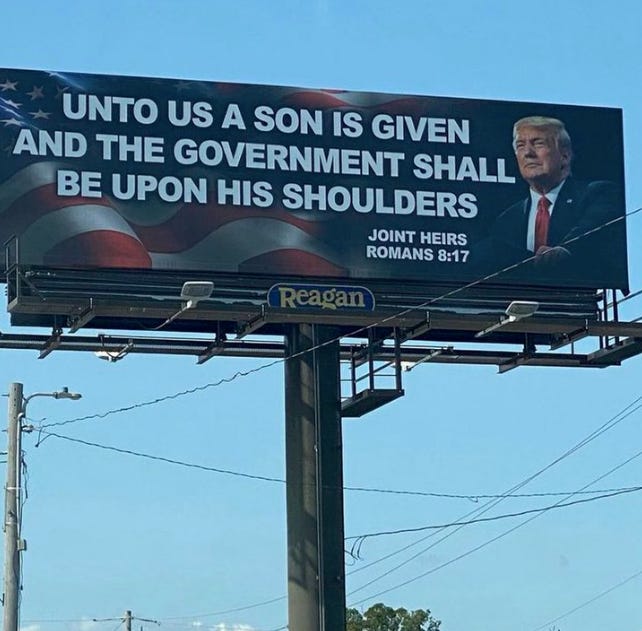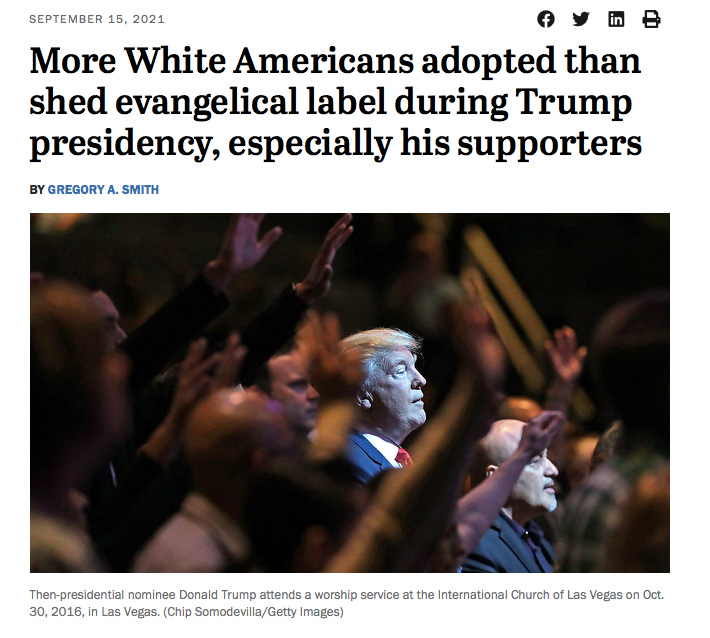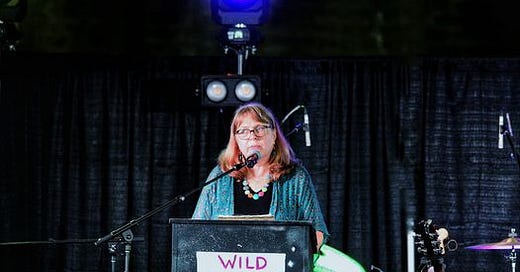
Discover more from The Cottage
This headline greeted me when I opened Twitter this morning:
The study, just released from the Pew Research Center, states:
Contrary to what some may have expected, a new analysis of Pew Research Center survey data finds that there has been no large-scale departure from evangelicalism among White Americans. In fact, there is solid evidence that White Americans who viewed Trump favorably and did not identify as evangelicals in 2016 were much more likely than White Trump skeptics to begin identifying as born-agin or evangelical Protestants by 2020.
They outline their conclusions in five bullets (quoted exactly below):
There was no mass departure of White Americans from evangelical Protestantism between 2016 and 2020.
Between 2016-2020, White Americans with warm views toward Trump were far more likely than those with less favorable views of the former president to begin identifying as born-again/evangelical Protestants.
There is no clear evidence that White evangelicals who opposed Trump were more likely than Trump supporters to leave the evangelical fold.
Trump garnered even more support in 2020 than in 2016 among White voters who identified as evangelical Protestants in both years.
The share of non-White U.S. adults who abandoned the born again/evangelical label in recent years is offset by the share who adopted it.
This may come as a surprise to regular readers of the Cottage, especially given the fact that I recently wrote about the decline of white evangelicalism and the slight uptick of those white Americans who are “non-evangelical Protestants,” a.k.a. “mainline Protestants,” in an essay “Not Dead Yet.” That article was based on recently released research from Public Religion Research Institute (full disclosure: I was on the PRRI board for a decade).
Questions arise: What’s going on here? Is Pew right and PRRI wrong? Are white evangelicals increasing, decreasing, or something else? And what does any of that mean for religion in America more generally?
* * * * *
There are two important things to understand regarding this research.
First, the two studies are actually different kinds of studies. The PRRI study that showed white evangelical decline is a national survey of all Americans. The Pew study is a more discrete research project with information drawn from the same respondents - they garnered the data from something called the “American Trends Panel” that followed a single group of respondents over time. All Americans versus specific Americans.
These are both legitimate ways of exploring issues in religion and politics, with different methodologies that discern different information. The PRRI study is about religious identity more generally, while the Pew study is about particular groups and their religious identity and political attitudes in two elections. One is broad stroke, the other finely focused. One goes wide, the other deep.
Second, both studies exist in a larger demographic context. In the four years between 2016 and 2020, the percentage of white Americans fell overall. There are now FEWER white people as a percentage of the total U.S. population than there were in 2016. Thus, in effect, Pew’s study focusing on white evangelical attitudes is a bit like some current polling of Republicans. If, for example, you (rightly) claim that 88% of Republicans continue to support President Trump, what you are actually saying is something like this: 88% of Republicans support Donald Trump even through there are fewer Republicans overall in the general population.
This point is significant. Note this line in the Pew release: “Among all White adults who participated in both the 2016 and 2020 surveys, 25% described themselves as born-again or evangelical Protestant in 2016; 29% described themselves this way in 2020” (emphasis mine). That’s not “all white adults” - just those in this survey group. It more explicitly does NOT mean that 25% of all White American adults were evangelicals in 2016, nor are 29% evangelicals in 2020. It only means that is the percentage of those white adults who participated in both surveys. Indeed, PRRI data found that 14% of all Americans are white evangelical Protestants (a decline of nearly 10 points in 15 years) and that 16% are white mainline (non-evangelical) Protestants, an uptick over four years).
Thus, evangelical support of Donald Trump - and its increase - exists in the shrinking demographic pool of white America.
* * * * *
While there is admittedly some tension in the numbers regarding growth and decline, there is also some clarity and some important information to be gleaned from the Pew report.
Regarding the tension, I spoke to Robert Jones, president of PRRI about the two surveys and their findings. (Robert Jones has a new Substack newsletter that I recommend.) He emphasized that PRRI’s and Pew’s data on national religious identification has tracked very closely over a period of years, even when some of their specific studies and interpretations of such data has diverged. Jones insisted that what appears to be a tension - or even a conflict - most likely comes from two sources: the current fluidity of trends (you don’t really have a trend until there’s about 5 years or more of data) and methodological issues. In other words, lots of people are making pronouncements about the future of American religion on the basis of incomplete data and shifting trend lines. And there’s probably some technical stuff behind the scenes in the data collections that needs to be compared and accounted for by the professionals.
In other words, there’s more work to be done before we completely understand the impact Trump has had on white evangelicalism - and white Protestantism more generally - before people start throwing stones, taking victory laps, or dancing on their religious competitors’ graves.
* * * * *
That said, what’s the takeaway from this compelling Pew report?
There’s one very significant thing to grasp regarding this research. People in religious groups experiencing the pressure of decline or perceived persecution harden their opinions and sense of identity.
It is easy to recall the millions of tweets directed against white evangelicals in the last five years shaming them for their support of Trump and the huge political effort mounted by a host of organizations to pressure white evangelicals to swing their votes away from Trump. Apparently, none of that worked. Instead of changing their minds, white evangelicals doubled-down religiously and politically.
Pew does note that some people DID leave evangelicalism - but that switch was offset by new pro-Trump evangelicals. When you combine this data with other data we have, the best guess is that those who left were younger white evangelicals. But that wound up being kind of a wash - as white evangelical ranks were refreshed by stronger support from pro-Trump voters who now identify as evangelicals. (It is worth noting that Trump himself insisted that he’d become an evangelical in those years. He left the Episcopal church he attended in Palm Beach and now considers himself part of a nondenominational church in Florida.) In short, being pro-Trump was an odd sort of evangelism in white evangelical circles, as white evangelicals replaced their own young adults with (most probably) older, politically like-minded peers.
This doubling-down has made me wonder about something - are we in the process of creating new categories of identity? White evangelicalism has become a political identity. It is racial - “white.” It is religious - “evangelical.” And it is political - “Trumpist.” White evangelicalism is now a race-based theopolitical identity. Perhaps it always was (Anthea Butler makes this case in her book White Evangelical Racism), but is only sharper and more obvious now. For most white evangelicals, the strands of their theological commitments and their political views are woven into a single fabric of meaning. You can’t pull a thread without unravelling the whole. Theology is politics and politics is theology - and all of it is dictated by a God who has a divine purpose for the faithful and for white America.
You can’t shame someone out of this. You can’t have a debate about views. If someone changes their mind about their theopolitical identity, it is because they’ve converted. That’s it. Conversion. A conversion. Or perhaps, a divorce.
* * * * *
Donald Trump always knew that support for him was about more than policies or political party. It was about him, a story and an image that he’d created in public over decades. The appeal of what pundits call his “brand” was a raw display of wealth, parading privilege, inviting others to imagine themselves living in a golden penthouse in the sky. He embodied a certain kind of independence, moxie, and glitz, not unlike Jim and Tammy Faye Bakker of an earlier evangelical era. Thinking about the Bakkers is helpful. They were caught up in financial corruption and a sex scandal. But their followers stayed with them for a simple reason - they loved the Bakkers. The Bakkers were them, outsiders who made it big, and whose successes in some way transferred to their legions of fans.
Somehow Trump - the entitled rich son of a real estate tycoon - wooed the evangelical heart. The legions of middle-class and working-class white churchgoers, whose dreams of success and God’s material blessings ebbed further away as the waves of technological, educational, and cultural change crashed against America’s Bible belt, fell in love with Donald Trump. He spoke to their hurting souls. Trump discovered their grief and turned it into grievance, promising evangelicals the power that had eluded them and the riches the faithful deserve. It may have started as an odd romance, a bit of a marriage of convenience, a cynical trade-off perhaps, but it became something more. A real love affair. And, as anyone who has ever been in love knows, someone who touches your heart and affirms your aspirations changes you - you will do anything for the beloved, remain loyal to that person until the very end. Combine that with a sense of divine providence, and, well, that’s hard to undo.
* * * * *
And that’s what’s missing from all the polls and analysis and political punditry. That evangelicals fell in love with Donald Trump. For a whole host of reasons - theological and political and other things. But the love became a marriage and the marriage provided a new sense of identity for white evangelicals who were losing their footing in pluralistic, post-modern America.
“Evangelical” has always been a kind of fungible and contested identity, a moniker with only rare historical moments of clarity. The early part of the twenty-first century was a particularly fluid time as conservative fundamentalists moved more toward classical evangelicalism and more moderate evangelicals embraced some aspects of the emerging social justice consciousness. It was internally in flux, tensions unknown to outsiders. Those evangelicals were arguing amongst themselves. Who was an evangelical, really? The offspring of Bob Jones and Jerry Falwell or the progeny of Carl F.H. Henry and Billy Graham?
Through the first years of this century, the former overtook the latter. And, as Billy Graham slowly declined, so did the more open, well-mannered, and intellectual style of evangelicalism. That left those-formerly-known-as-fundamentalists in charge of the whole evangelical game, with few nationally recognized leaders and no one person who represented their fears and hopes. Enter Donald Trump, the unlikely theopolitical savior, who recently was depicted on a billboard in Georgia as the Son of God. Blasphemy? Perhaps. But surely evidence of a love divine excelling all other loves.

That’s why I say conversion. It is the only way change happens in evangelicalism. A change of mind and heart, a metanoia, a spiritual awakening. Basically, these Trump evangelicals have got to get born again - again.
What America needs is revivalists and evangelists who can tempt evangelicals away from their bad marriage with Donald Trump and woo them back into the arms of Jesus - the Jesus who calls people to love our neighbors, who blessed the poor, outcasts, and peacemakers, and who invited everybody to feast at God’s table. Jesus, whose first followers dreamed of a world where there was no longer Jew or Greek, slave or free, or male and female - theirs was a vision of human solidarity and compassionate justice. Those first followers also claimed a new identity - People of the Way. It wasn’t a way of privilege and power and success; rather, it was a way of humble love for all of creation, indeed, a way of sacrifice for the sake of others.
That’s the only theopolitical identity in the Bible. And it should be the only identity those of us called Christians should ever take as our own.
INSPIRATION
Love divine, all loves excelling,
joy of heav’n, to earth come down,
fix in us thy humble dwelling,
all thy faithful mercies crown.
Jesus, thou art all compassion,
pure, unbounded love thou art.
Visit us with thy salvation;
enter ev'ry trembling heart.
— Charles Wesley
You can safely assume you've created God in your own image when it turns out that God hates all the same people you do.
― Anne Lamott
Whatever your heart clings to and confides in, that is really your God, your functional savior.
― Martin Luther
No more terrible disaster could befall your people than for them to fall into the hands of a Hero.
― Frank Herbert
How many times
Does a Southern town
Waste white genius
To keep the Blacks down?
How many times
Does progress stop
To find the maimed
A mythical prop?
How many times
Do a Führer’s claws
Dig up dry bones
Of the gray Lost Cause?
How many times
Does the ermine class
Throw scraps of hate
To the starved white mass?
…Idols of the tribe
Jail the spirit fast.
Scorn of lesser breeds
Flash and bone outlast.
— Melvin B. Tolson
A CONCLUDING NOTE
Today’s email is free to everyone at the Cottage - and everyone you share it with! The Cottage is a place for faith different - beyond denominational and sectarian lines - for people who love their faith communities and those who are questioning - where inspiration meets information to enrich our hearts and grow in understanding of faith, spirituality, and religion in these chaotic days. We’re holding onto one another as we dream of a world of deeper love and wider justice.
But there’s even more to the Cottage than the newsletter! You can join the Cottage community as a supporting participant.
Subscribers support my writing financially - enabling me to develop online resources -and donate so that others can join the community. There are occasional members-only posts, access to The Secret Garden (a private podcast!), and the opportunity to participate in monthly Zoom gatherings. Click the button “subscribe now” for more information.












All the sermons I heard about how ‘even the elect will be deceived’ by the antichrist always made me ask, “how can this be?” Now I know.
It is sad to see so many Christians walk away from Jesus to embrace an idol named Donald. It reminds me of a house I pass regularly. They have a half dozen pro-Trump signs and just added a five foot statue of Trump. That is idol worship.
Bob Miller